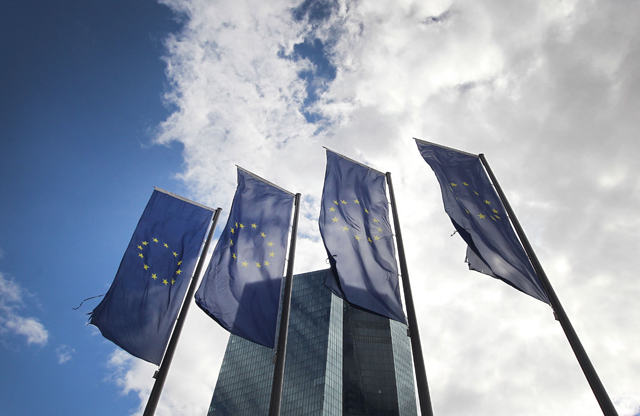You are here
EU sees eurozone growth ticking up in 2025 but risks loom
By AFP - Nov 17,2024 - Last updated at Nov 17,2024
BRUSSELS, Belgium — The European Commission on Friday predicted economic growth to pick up slightly and inflation to keep falling in the eurozone next year, while warning of growing risks linked to geopolitical tensions.
Forecasts by the commission showed eurozone growth accelerating slightly to 1.3 per cent in 2025, up from 0.8 per cent this year, while inflation in the 20-country single currency area was seen easing to 2.1 per cent, down from 2.4 per cent.
"With the EU economy steadily recovering, growth should pick up more speed next year," Commission Vice-President Valdis Dombrovskis said.
"Still, given today's high geopolitical uncertainty and many risks, we cannot afford to be complacent. We need to deal with longstanding structural challenges".
The growth figure was virtually unchanged from the last forecast the EU executive body published in June, when it envisaged economic activity would increase by 1.4 per cent in 2025.
On Friday, it said domestic demand was projected to drive future growth, expected to reach 1.6 per cent in the eurozone in 2026.
"As the purchasing power of wages gradually recovers and interest rates decline, consumption is set to expand further," it said.
"Investment is expected to rebound on the back of strong corporate balance sheets, recovering profits, and improving credit conditions."
Inflation has dropped significantly over the past two years after reaching 8.4 per cent in 2022, following Russia's invasion of Ukraine, and 5.4 per cent in 2023.
The expected further slowdown would bring it very close to the European Central Bank's (ECB) two-per cent target in 2025.
Eurozone unemployment was projected to stand at 6.5 per cent in 2024, then edge further down to 6.3 per cent in 2025 and 2026, the commission said.
But it also warned its outlook was subjected to growing "uncertainty and downside risks" linked to an ever-tenser geopolitical context, with Russia's war in Ukraine and conflicts in the Middle East continuing to imperil stability and energy security.
'Narrow path'
While not cited directly, Donald Trump's imminent return to the White House following his US presidential election victory this month also loomed large on the EU's economic prospects.
"A further increase in protectionist measures by trading partners could upend global trade, weighing on the EU's highly open economy," the commission said.
Trump repeatedly professed his love for tariffs on the campaign trail, threatening to target the European Union in particular.
That could trigger a damaging trade war between the United States and Europe, with economists warning that even 10-per cent tariffs could hit European economic output.
"The commission will engage with the new administration with a great spirit of cooperation, but also with the idea that we have to defend our strength as an economy which is open to trade," said Paolo Gentiloni, the EU's commissioner for economy.
On the domestic front, the commission warned that "policy uncertainty and structural challenges" in the manufacturing sector could further weigh on competitiveness, growth and the labour market.
Europe's powerhouse Germany is to hold early elections in February after a political crisis, as manufacturers, particularly in the automotive sector, have been hit hard by rising competition in key market China, especially on electric cars.
"Member states will have to walk a narrow path of bringing down debt levels while supporting growth," Gentiloni said.
"Strengthening our competitiveness through investments and structural reforms is crucial to lift potential growth and navigate rising geopolitical risks."
A landmark report by former Italian Prime Minister Mario Draghi this year raised the alarm over Europe's failure to keep up with the United States, underlining the EU's low productivity and economic slowdown.
It said Europe must invest up to 800 billion euros ($863 billion) more a year to avoid falling further behind.
Related Articles
PARIS — The world economy is likely headed for a soft landing next year, the Organisation for Economic Co-operation and Development (OECD) s
The risk of international conflict is now the biggest threat facing countries and businesses in the coming decade, trumping concerns about the economy, the World Economic Forum (WEF) said on Thursday.
FRANKFURT — The European Central Bank (ECB) announced the largest rate hike in its history on Thursday, as runaway energy prices drove euroz













